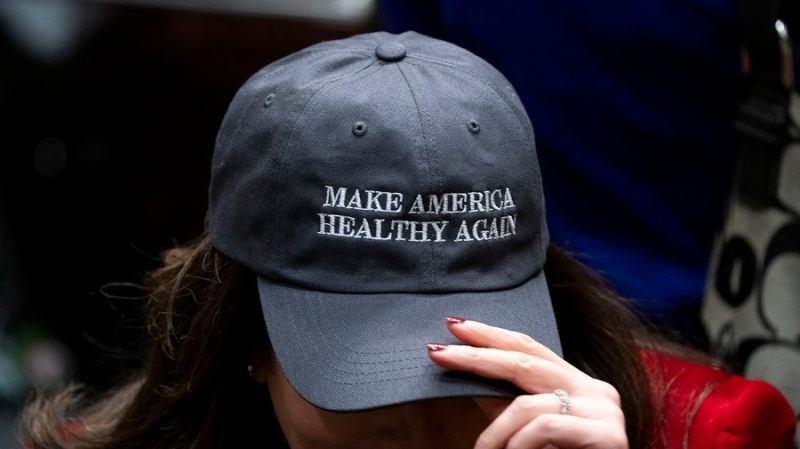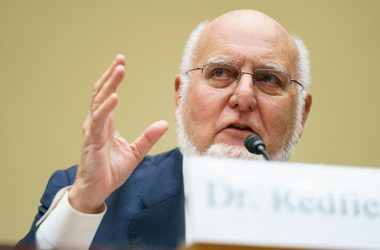The “Make America Healthy Again” (MAHA) movement could be on a collision course with its Republican allies over pesticides and toxic chemicals.
MAHA is strongly aligned with the Trump administration, having cheered its anti-vaccine actions and food safety reforms. In general, the movement has been deeply skeptical of Big Pharma, Big Agriculture and Big Chemical.
And cracks are beginning to form.
MAHA-aligned groups and influencers are particularly raising alarms about provisions in a House appropriations bill that they say will shield pesticide and chemical manufacturers from accountability — and ultimately make Americans less healthy.
Meanwhile, a draft of the administration’s “MAHA report” reportedly omits any calls to prevent pesticide exposure, also disappointing advocates.
“It’s obvious that there are tensions within this newfound coalition between MAHA and MAGA, and there are some big issues there,” said Mary Holland, CEO of Children’s Health Defense, a group that was founded by Health and Human Services Secretary Robert F. Kennedy Jr., considered the MAHA flagbearer.
Conservatives have traditionally sided with big business, supporting fewer regulations on potentially toxic substances.
Kennedy and his disciples, meanwhile, espouse stricter environmental protections, while also bucking mainstream science on vaccine safety.
The disparities on chemicals and pesticides within their coalition put Republicans in the middle: Do they side with big business or health concerns?
On many issues, business interests appear to be winning.
The New York Times reported last week, based on a draft that it obtained, that a forthcoming iteration of the Trump administration’s MAHA positions does not call for new restrictions on pesticides and describes existing procedures as “robust.”
MAHA-aligned activists recoiled.
“The MAHA draft report stating that the EPA’s [Environmental Protection Agency] pesticide review process is ‘robust’ is the biggest joke in American history. And it’s not funny. It’s deadly,” wrote Zen Honeycutt, founder of the activist group Moms Across America, in a post on X.
Meanwhile, a Republican-authored House Appropriations bill seeks to block pesticide labels that go beyond what the EPA uses based on its current human health risk assessment.
During a markup last month, Rep. Mike Simpson (R-Idaho), who chairs the Interior-Environment Appropriations subcommittee, said that the measure says that “states cannot require a pesticide label that is different from the EPA label.”
“The language ensures that we do not have a patchwork of state labeling requirements. It ensures that one state is not establishing the label for the rest of the states,” Simpson said, adding that his comments were meant to be clarifying for all the “MAHA moms that are out there that are concerned about this that have been calling.”
But critics say such a move could prevent the use of updated science on pesticide labels.
“This section, section 453, would basically handcuff EPA, companies and states as well as advocates to … research that could be outdated by over 15 years,” said Geoff Horsfield, policy director at the Environmental Working Group.
“The language in here … says that EPA should only update labels according to the human health risk assessment. EPA, by law, is required to do those human health risk assessments every 15 years, but they often don’t complete those in time,” Horsfield said.
“The way the law works currently is states have the power to do additional addendums, and that’s where you see, say, a state requires an additional setback so that you can’t spray within 250 feet of a school, or you’re required to wear additional types of [personal protective equipment],” he continued. “Those types of restrictions are usually included in a label addendum, and those types of changes and those types of tweaks would be essentially prohibited by this language.”
MAHA opponents have particularly expressed concerns over the implications that barring such labeling could have on the ability to sue pesticide companies over inadequate labels.
“Having no access to courts is absolutely devastating and, in my view, unconstitutional,” said Holland, with Children’s Health Defense. “I’m very distressed by this idea that this administration might, for 2026, establish liability protection.”
Democrats likewise pushed back on the provision.
“This rider would effectively gag our public health agencies, preventing them from updating labels or rules to reflect new evidence of cancer risks from pesticides,” Rep. Debbie Wasserman Schultz (D-Fla.) said during the markup. “This bill is a big middle finger to cancer patients.”
Also causing controversy is another provision related to “forever chemicals,” toxic substances that have been linked to illnesses including cancer and have become widespread in the environment.
The measure seeks to bar the EPA from enforcing a draft report that found that food from farms contaminated with these chemicals may pose cancer risks.
Lexi Hamel, a spokesperson for Simpson, said in an email that the bill “prohibits funding from implementing, administering, or enforcing the current draft risk assessment due to the major technical flaws in the assessment.”
But she said it does not block the EPA from “continuing to work on identifying ways to clean up PFAS and keep communities safe” and that an amendment changed the bill so that it no longer blocks the agency from finalizing its findings.
In a follow-up statement shared through a spokesperson, Horsfield said the provision is still a problem.
“The risk assessment will still have to be implemented and enforced,” he said. “The draft risk assessment will need teeth … Allowing EPA to finalize the draft risk assessment, but preventing them from implementing it is an exercise in futility.”
MAHA activists have slammed both provisions, saying in a letter to President Trump that GOP support for the measures is “unconscionable.”
However, Tony Lyons, president of the MAHA Action PAC, said he does not blame Republicans for pesticides in the environment.
“I don’t think that this is something that comes from the GOP side. I think that this is a case of the Democratic Party looking to blame Republicans for it,” Lyons said.
While the pesticide issues have generated some sparks between MAHA and MAGA, the administration has taken a number of other actions to also reduce restrictions on the chemical industry more broadly.
Trump himself exempted from environmental standards more than 100 polluters, including chemical manufacturers, oil refineries, coal plants and medical device sterilizers.
The EPA, meanwhile, has put chemical industry alumni in leading roles and has said it wants to loosen restrictions on emissions of various cancer-linked chemicals.
Asked about Trump’s move to exempt polluters from Clean Air Act rules, Holland said “there’s clearly tensions” within the GOP coalition.
“Those factions, if you will, more protective of corporate and more challenging to corporate, are both striving to get the president’s ear, and I don’t think they’ve come to a complete, sort of settlement agreement,” she said.





